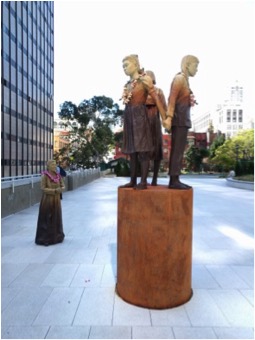By the end of Japan’s colonization of Korea (1910-45), over two million Koreans lived in Japan. My grandfather, for instance, came to Japan as a soldier in the Japanese Imperial Army. (I don’t know when.) Others had come to supply the wartime labor shortages in mining and construction. The majority of these colonial migrants were then immediately repatriated to the Korean peninsula, despite the geopolitical volatility that ultimately led to the foreign-imposed division and the genocidal Korean War. Meanwhile, yet another mass exodus of Koreans from Jeju island to Japan followed the 4.3 Uprising in 1948. Those who stayed in Japan through and after the division and war–approximately six hundred thousand ethnic Koreans–lost their Japanese citizenship and effectively became stateless under the 1952 San Francisco Peace Treaty. Severed from access to political equity and cultural belonging in Japan, some fifteen percent of these Zainichi Koreans (Korean postcolonial exiles and their descendants in Japan) participated in a mass repatriation program to North Korea in the 1960s and 1970s, even though their ancestral origins concentrated in the southern parts of the peninsula. This photograph [see cover image] depicts one such shipment of Koreans back to their home, which did not precisely turn out to be a paradise. Recently, the 2017 bestselling novel Pachinko by Min Jin Lee has brought increased attention to Zainichi Koreans from the Anglophone world.
The collective stories of Zainichi Koreans do not unfold as a simple narrative of victimhood, nor do they form a diasporic stronghold. Any sociological attempt to quantify the extent of assimilation or so-called “creolization” of Zainichi Koreans presumes a dichotomous distinction between Korean and Japanese cultural authenticities, while downplaying the archipelagic relationalities among these islands and peninsulas. The stories of this fragmented community of ethnic Koreans in Japan, in which I continue to struggle to claim my own belonging, tell us much more of the contradictions of Japanese colonialism, US imperialism, and even Korean nationalism than who Zainichi Koreans are. Here, I focus on a story of a Zainichi Korean community that emerged in the United States in the twenty-first century for the purpose of healing and decolonial solidarity. Reflecting on complex meanings of peace and unification, I assert that a sense of inter/national security predicated on material and symbolic border-making is afforded through the militarization of sovereignty. In contrast, Zainichi Koreans’ experiences of statelessness and non-belonging, as well as solidarity-building, highlight a pathway toward demilitarized peace as a collective process.
Koreans in Japan do not share a singular identity. I never really identified as Korean until I came to the United States and started making Korean/American friends. Growing up in Japan with Japanese citizenship and only a Japanese name, the little connection I had with anything Zainichi Korean was my second-generation father and his family. All of my Korean relatives used Japanese names, and none of them spoke Korean. They were not part of either of the mainstream Zainichi community organizations, the pro-South Mindan and the pro-North Sōren/Chongryun. These two factions maintain a fierce rivalry within the Zainichi community, and peninsular Koreans often regard both groups as traitors. Meanwhile, the terms zainichi chōsenjin and zainichi kankokujin usually refer to stateless ethnic Koreans with special permanent resident status in Japan and either now-defunct pre-division Korean (chōsen) nationality or South Korean (kankoku) nationality, respectively. Legal status, ethnic identity, nationality, and citizenship never aligned neatly. People like my father and older brother do not have citizenship of any country, whereas I do not legally count as Zainichi, as a Japanese citizen of Korean descent. As recently exemplified by the case of the American actor Fred Armisen, who found out on a PBS series that his late grandfather was Korean rather than Japanese, many people of Korean descent in and from Japan do not know that they are Korean. I at least knew I was Korean, but I did not have the means to make sense of my Korean heritage; I went to public schools in rural and suburban Japan, where I had more classmates of Brazilian, Peruvian, and Venezuelan nationalities than anyone markedly Korean.
I never expected to find other Zainichi Koreans in the United States. My decision to attend San Francisco State University after high school was an example of what the sociologist Héctor Carrillo calls “sexual migration,” as my relocation was partly motivated by my sexuality and sense of queerness. I wanted to study and take part in LGBTQ activism. This move, however, ended up emplacing me into a network of people whose complex histories emerged from the collision and collusion between Japanese and US imperialisms: Korean/Americans, Okinawans, transnational adoptee Koreans, and finally, Zainichi Koreans. In December 2008, I attended a report-back event in Oakland hosted by the US-based Zainichi Korean community organization Eclipse Rising, two of whose members had previously participated in a Korean/American peace delegation to North Korea. For the first time in my life, I was in a space with other Zainichi Koreans and we could talk about our experiences. Most importantly, I did not have to subsume my queer identity under my Zainichi one, or vice versa.
Eclipse Rising–the name symbolizes the Zainichi power to eclipse the imperial Rising Sun–held a founding retreat in 2009 to articulate its missions: personal liberation, community development, and public education. Building grassroots solidarity along multi-scalar lines has been a key strategy for all phases of Eclipse Rising’s work in the past ten years. We’ve held numerous film events, rallies, and actions, working closely with Korean and other Asian/American organizations for peace, demilitarization, and fair trade. We also organized an education and solidarity tour to visit social justice organizations in Japan. In 2011, in the wake of the devastating 3/11 earthquakes, tsunami, and nuclear disasters in Japan, we co-established the Japan Multicultural Relief Fund to build a philanthropic bridge between communities of color in the United States and minority and marginalized communities in Japan. Our historical memories warned us of Japan’s disaster nationalism.
Most recently, and since 2015, Eclipse Rising has focused on rigorously challenging and countering the rising right-wing conservatism in Japan under the Abe administration through our support and advocacy for “Comfort Women” victims and survivors. In 2017, Eclipse Rising mobilized members and fellow scholars and educators of the Association for Asian American Studies (AAAS) to endorse a resolution we drafted to express solidarity with former “Comfort Women.” We are also a vital member organization of the multi-ethnic “Comfort Women” Justice Coalition, which erected a memorial titled “Women’s Column of Strength” in San Francisco’s Chinatown in 2017, the first of its kind in a major urban center in the United States [Figure 1]. When San Francisco accepted this memorial as a donation, the Mayor of Osaka promptly began to threaten their sixty-year-long city relationship, ignoring the critical voices and support provided by Osaka’s residents (many who identify as Zainichi).

Figure 1: “Women’s Column of Strength,” a “Comfort Women” memorial in San Francisco Chinatown, installed September 2017 (source: photograph taken by the author)
In all of these community efforts, an interrogation of militarism, neoliberal capitalism, and heteropatriarchal nationalism has been central to Eclipse Rising’s methodology for actualizing solidarities. As Zainichi Koreans, we have intimate knowledge of how material and symbolic borders police, immobilize, displace, exclude, and alienate. As a stateless diasporic community, we also have a keen and embodied sense of interconnected struggles of racialized, immigrant, and indigenous communities across the trans-Pacific region. Any definition of peace or security that fortifies international borders instead of dismantling them is antithetical to genuine peace and collective security. Any vision of civil engagement that denies history, however traumatic, does not foster change. Remembering, despite attempts by the US and Japanese states to erase and obscure, is healing and can be a collective process.
I have twice been to Panmunjom, the area between North and South Korea in which Kim Jong Un and Moon Jae In performed a historic handshake in April 2018. Due to my Japanese citizenship I was able to go there from both sides of the demarcation line. Despite the obvious significance of this event, the summit left me wondering what unification means, feels, and looks like for those of us who have never been and will never be a part of the nation to begin with. More than theatrically-staged live-streamed events, the tenacity of diasporic Korean community organizers like Eclipse Rising members, with whom I continue to pursue my political and intellectual work, permits us to imagine and embody our own sense of demilitarized peace.
Cover image: Mass repatriation of Zainichi Koreans to North Korea (source: Photograph Gazette, January 15, 1960 issue via Wikimedia Commons)


